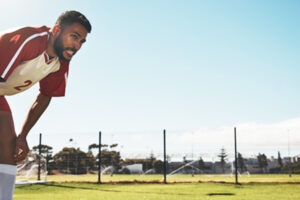
Less fit players have to train less
We all know the discussions about a (new) player whose fitness level is lower than the rest of the team due to, for example, an injury or a late arrival in pre-season. Traditionally, coaches make this player do extra work to catch up with his teammates again. But is this really the best approach? Should a less fit player train more than his fitter teammates?
The relation between intensity and volume
Just imagine you are running on a treadmill with 10 kilometers per hour and after 30 minutes you are exhausted. So, the intensity is 10 km/hr and the volume is 30 min. What will happen if you decide to run with a higher intensity next week? Let’s say you will be running at 15 kilometers per hour. What will happen with the volume? Will you still be able to run for 30 minutes? Obviously, asking the question is answering the question. If you are lucky you will be able to run at 15 km/hr for 20 minutes. In other words, when the intensity goes up the volume will go down. What does it take for you to eventually run at 15 km/hr for 30 minutes?
Gradual build-up
After you initially ran at 15 km/hr for 20 minutes, the next week or month you will be able to maintain this intensity for 21 minutes. Another week or month later, you can run for 22 minutes at 15 km/hr. Based on this gradual build-up, after several weeks or months, you will eventually be able to run at 15 km/hr for 30 minutes. Everyone can see him- or herself doing this and understands it takes time. Nobody can jump from 20 to 30 minutes in a split-second.
This same principle applies when a player returns from injury, arrives late in pre-season or decides to join a club at a higher level of play. The moment he joins the team training he has to deal with a higher intensity. So, what will be the consequence in terms of his training volume? Indeed, the player will not be able to maintain the training like his fitter teammates. Otherwise, you could ask the question what his teammates have been doing during his absence.
From Academy to First Team
Let’s take the example of a youth player who is promoted to the first team. His starting fitness level is probably lower than that of his new (adult) teammates. In the Under 19 he used to train and play with a lower intensity (fewer actions per minute) compared to the first team. If we use the above treadmill metaphor we could say that this player used to play at 10 km/hr and now needs to learn to play at 15 km/hr. Last season he used to train five times per week while at
Thrown in the deep?
In the context of the metaphor, it means that the youth player has to jump from ’five times per week at 10 km/hr’ to ‘six times per week at 15 km/hr’. What will happen if the coach throws this player in the deep? Again, asking the question is answering the question. Just imagine you can run on the treadmill for 30 minutes at 10 km/hr. What will happen to you if next week you all of a sudden have to run at 15 km/hr for 45 minutes? Yes, you will get exhausted and break down. And this is exactly what happens each (pre-)season to all these talented players around the world. They are thrown in the deep by their uneducated coaches who work based on tradition rather than knowledge and logical thinking. Consequently, these players will get exhausted after a few days or weeks with the first team, their performance will drop and eventually they will get injured. Ask yourself this question: how many dreams of talented players worldwide are destroyed each season by coaches who do not understand the above principle?
Temporarily less training volume
What you would expect is that the youth player gets the opportunity to adapt to playing football at a higher intensity with adults rather than players of his age. In other words, the player initially only trains four times per week at ’15 km/hr’. Next week or month, his training volume is increased to 4,5 times per week followed by 5 times per week the week or month after. Step by step the training volume will increase until the moment the new player is able to train 6 times per week at
Training LESS than the TEAM but HARDER than HIMSELF
The conclusion is that a player with a lower fitness level should temporarily train LESS than his fitter TEAMmates. But he should train HARDER than his less fit SELF last week! By applying this principle over time the player will eventually reach the training volume of the team. The above is no rocket science. It’s simple, factual and undeniable. It would save the dreams of thousands of talented youth players around the world each season as well as the career of players who return from injury, arrive late in pre-season, decide to join a club at a higher level and many other players.


